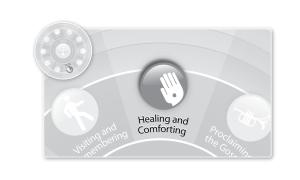 Post by Pastor Tim – My last post on Confessing Your Sins to One Another led to a great question from Val, a brother in the Lord.
Post by Pastor Tim – My last post on Confessing Your Sins to One Another led to a great question from Val, a brother in the Lord.
Q. If we practice “confession of sins to one another” how do we ensure confidentiality, particularly for sins that may be the occasion for gossip? What if someone confesses to committing a crime and one of his brothers/sisters calls the police? How do you address these concerns in your model of group confession?
Evangelicals have been led to believe that the Protestant Reformation freed us from confession related to other humans. The Reformation rightly responded to some of the abuses related to confession which included the “indulgences of the Medieval Era.”
And admittedly, it is hard to imagine “group confession” taking place in most of our churches. For example, it would be very time consuming for this kind of confession to take place in a church over 50 people, let alone 500 people. It would also be hard to imagine people being willing to confess their sins to a bunch of other people with whom they have never met or have no relationship with. Gossip and misunderstanding would certainly run rampant.
But most evangelical churches have thrown “the baby out with the bathwater” when it comes to confession. The Bible teaches us that “confessing our sins to one another” is an important part of the Christian life.
It’s not the Biblical concept of confession that needs to change as much as our concept of church. Fundamentally, we need to understand that church doesn’t begin and end on Sunday mornings. Church begins in each of our households (during the week) with our families and those within our spheres of influence.
For our family, church takes place every evening when my family sings, prays and memorizes Scripture together. And from time to time, we have neighbors, friends and other family members join in. This is where the real work of discipleship takes place, and also where the real work of confession happens. When we gather with others on Sunday morning, it is more for equipping the leaders of each household to lead and disciple their own households.
The discipleship of my children is not the Sunday schools’ responsibility; it is my responsibility (and my wife’s). Introducing my neighbors to Christ, is not the Evangelism Committee’s responsibility, it is my family’s responsibility! Confession of sins to one another also follows in a similar vein.
When we go to church on Sunday, my wife and I have been modeling confession to our kids all week. So even though the particular sin that each of us confess may be new, the process is not. If I’m not confessing my sins before my children and my wife during the week, then I probably have no business confessing my sins on Sunday in front of anyone else. And if the Sunday group is too large to confess all together, then everyone retreats to their household units to confess and pray for each other during the Sunday service. Remember, the purpose of the Sunday service is to train the leaders of each household group on how to “be the church” during the week!
Issues such as safety, confidentiality and fear of jail sentences, as it relates to confession, are topics that the Bible is surprisingly silent on. Some of these things are not so much the consequences of confession, as much as they are the consequences of that particular sin. But if we do face consequences for doing the right thing, then Scripture is actually being fulfilled which promises that “everyone who wants to live a godly life in Christ Jesus will be persecuted.”
That is not to say that we can’t be wise in how we confess. In other words, there are some things that would be more appropriate to confess to my wife rather than my children. I may also want to share my confession with a pastor or more mature Christian for their perspective, before I confess to the congregation. We must also be careful in how we confess, because seemingly innocent confessions can sometimes be very prideful and full of gossip. Finally, we should be aware of the law as it relates to crimes such as child abuse. In most states, there is a legal duty for mandatory reporters to report suspected cases of child abuse.
Confession of sins to one another is particularly difficult, because the church has strayed far away from the New Testament model that James was familiar with when he wrote, “Therefore, confess your sins to each other and pray for each other so that you may be healed. The prayer of a righteous man is powerful and effective.” Admittedly, knowing how, when, and to whom to confess are difficult issues. This is what the Sunday leader’s meetings are perfect for addressing. For us, Sunday is not as much for confession as much as it is a training in how to guide and respond to the confessions of those in our sphere of influence.
Don’t spend time worrying about confessing your sins to your 1,000 member church. Begin to practice and model the “confession of your sins to one another” in your daily worship time within your own household.











nailed it.
Thanks James!